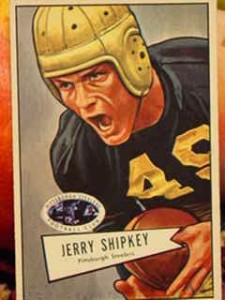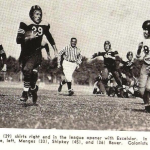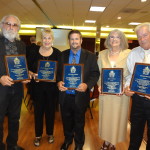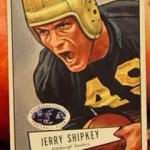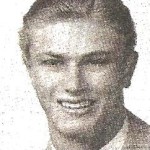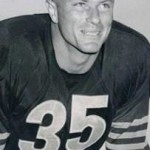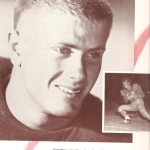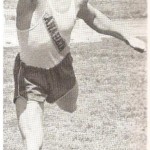Legendary Hall of Fame athlete Jerry Shipkey has the distinction of being the only person to play in the Rose Bowl for both USC and UCLA. But his accomplishments as an athlete include much more. Shipkey went on to a standout career in professional ball with the Pittsburgh Steelers and was also a record-setting track and field star in high school and college.
Born Oct. 31, 1925 in Fullerton to Arthur and Katherine Shipkey, Jerry wasn’t the family’s only star athlete. His father was an All-American tackle at Occidental College in the 1920s who was nick- named “Battleship.” Uncles Ted and Harry were All-American football players at Stanford University in the 1920s.
His brother, Art, was also a top player. A 1940 Anaheim grad, Art was a swift, powerful back who excelled at blocking. Art was named the Colonists’ Most Valuable Player after leading the team to its first ever Sunset League title in 1939 and was also the first Anaheim football player to be named All-CIF.
Jerry succeeded his brother in the Colonists’ backfield and helped Anaheim win a pair of Sunset League titles and championship game appearances.
Shipkey started setting records in his freshman year at Anaheim. In 1940 he set the shot-put (iron ball) record at 46-feet, 11¼-inches. In 1942 he set a Southern California field meet record of 54-feet, 5-inches. He set a new school record in 1943 at 57- feet, 10-½ inches. Then, again in 1943, he set the state shot put record with a throw of 54-feet, 9-inches, a record that remained his for several years.
Of course, Jerry was also a football star at Anaheim High. In his freshman year while playing with his brother, Art, the Colonists beat Fullerton High, Anaheim’s top rival, for the first time in 16 years. The score was 7-0. He was named All-CIF fullback.
In 1941, his team won the Sunset League in football. This was the same year Anaheim fans first attended home games played at night under the lights at La Palma Park Stadium. (The games under the lights were stopped the following year until the wartime blackouts were no longer required.)
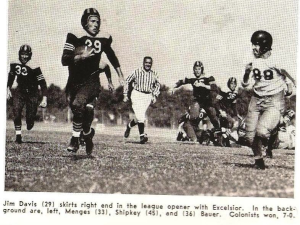 Though a broken collar bone ended his senior season just after it had begun, he achieved numerous credits at Anaheim including Varsity Football All-Southern California player; Varsity Track Most Valuable Player; Varsity Basketball player; and Varsity “A” Club president.
Though a broken collar bone ended his senior season just after it had begun, he achieved numerous credits at Anaheim including Varsity Football All-Southern California player; Varsity Track Most Valuable Player; Varsity Basketball player; and Varsity “A” Club president.
After graduating from Anaheim in 1943, Shipkey entered USC under the Naval V-12 program, a college training program initiated in 1943 to meet both the immediate and long-range needs for commissioned officers to man ships, fly planes and command troops called to duty in WWII. Between July 1, 1943, and June 30, 1946, more than 125,000 college-age men were enrolled at 131 colleges and universities throughout the United States in this elite program.
His hope was to play football for USC and, indeed, he did. Shipkey started the 1943 season on the Trojans’ junior varsity and he was “the seventh of seven fullbacks, behind some great players” in USC’s 1944 Rose Bowl appearance, he told The Los Angeles Times in 1993 interview. USC defeated Washington 29-0.
His USC tenure was interrupted when he entered WWII as a Navy ensign. On V-J Day (Victory over Japan), Aug. 14, 1945, Shipkey was on a torpedoed boat in Long Island Sound, yet survived the war without a scratch. At the war’s end, Shipkey transferred to UCLA in 1946 to resume his education and athletic career.
Shipkey played halfback on the first UCLA team to register an undefeated regular season in 1946. In a 13-6 victory at Cal that season, Shipkey rushed for more than 100 yards, scoring the Bruins’ winning touchdown on a two-yard run after he had rumbled 79 yards to set up the final TD.
In 1947 he played for UCLA in the Rose Bowl against Illinois. UCLA lost, 45-14, for the only defeat of the season. He is believed to be the only player in two Rose Bowl football games, having played for both USC and UCLA.
Along with three seasons of football, Shipkey was also a member of the UCLA track team and competed in shot put, javelin and discus, setting numerous personal bests in the shot put during his career. He was inducted into the UCLA Athletics Hall of Fame in 1995.
“It was a great way to get an education. I didn’t have a real problem transferring because my ties to USC weren’t too strong,” Shipkey told the Orange County Register in 1993. “In those days everything was about going to classes and the war.”
After graduating from UCLA in 1948 with a bachelor’s degree in history, Shipkey turned pro. But Shipkey did more than “make the pros.” He spent five seasons (1948-52) with the Pittsburgh Steelers and played in the first three Pro Bowls (1951-53). He set a team record with eight rushing touchdowns as a rookie fullback but spent the majority of his Steeler career as a defensive player.
The Steelers had only one winning season during Shipkey’s tenure, 6-5-1 in 1949, but Shipkey developed a reputation as one of the league’s harder-nosed players.
He won the team’s “Iron Man Award” one season and a Dapper Dan Club of Pittsburgh Achievement Award in 1952. The Dapper Dan banquet program said of him: “Never before has there been more of a flaming, fighting football spirit shown on a local football field by a professional player than that displayed by Jerry Shipkey in 1951. Through defeat and disaster, Shipkey held his head and spirit high.”
Shipkey’s size and appetite were often a topic of discussion by sports writers and others. At 6-feet–1, 215 pounds through high school and college, Shipkey was considered very big for his day, and his on-field prowess was rivaled by his appetite. One sports writer devoted an entire column to what Shipkey ate for breakfast on a train ride home from Oregon. “I started with cantaloupe, had a dozen eggs, 10 slices of bacon–it just went on and on, and I topped it off with a bowl of ice cream,” Shipkey said. “I used to drink six quarts of milk a day in high school. I don’t know how my dad afforded me, to tell you the truth.”
Shipkey was traded to the Chicago Bears in 1953, but an exhibition-game shoulder injury drastically curtailed his playing time and eventually forced him to retire.
Following his NFL career, Shipkey returned to Anaheim and worked with his father and brother as a gas and oil distributor. He later went into business as a wholesaler of auto parts and equipment and also built a successful real estate career. He passed away Nov. 28, 2009 at age 84 at his home in Dana Point.
- Jerry Shipkey – Class of 1943
